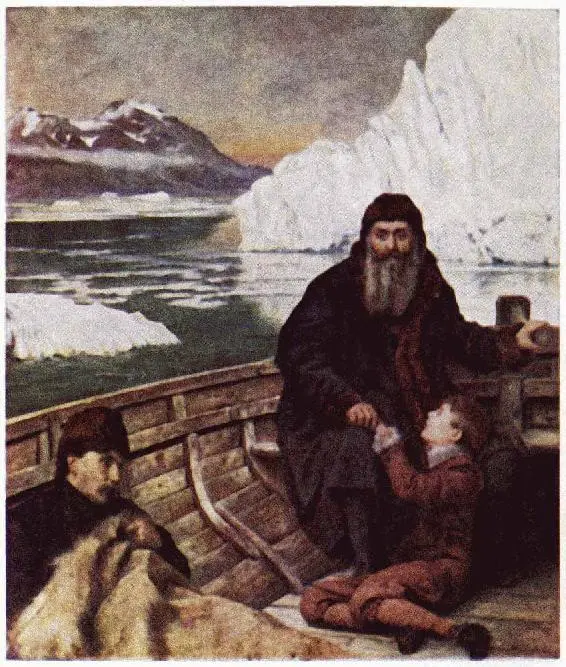Of game there was abundance then, as now—rabbit and deer and grouse enough to provision an army; and Hudson offered reward for all provisions brought in. But the leaven of rebellion had worked its mischief. The men would not hunt. Probably they did not know how. Certainly none of them had ever before felt such cold as this—cold that left the naked hand sticking to any metal that it touched, that filled the air with frost fog and mock suns, that set the wet ship's timbers crackling every night like musket shots, that left a lining of hoar-frost and snow on the under side of the berth-beds, that burst the great pines and fir trees ashore in loud nightly explosions, and set the air whipping in lights of unearthly splendour that passed them moving and rustling in curtains of blood and fire. As anyone who has lived in the region knows, the cowardly incompetents should have been up and out hunting and wresting from nature the one means of protection against northern cold—fur clothing. That is the one demand the North makes of man—that he shall fight and strive for mastery; but these whimpering weaklings, convulsed with the poison of self-pity, sat inside shivering over the little pans and braziers of coal, cursing and cursing Hudson.
In the midst of the smouldering mutiny the ship's gunner died, and probably because the gutter boy, Greene, was the most poorly clad of all, Hudson gave the dead man's overcoat to the London lad. Instantly there was wild outcry from the other men. It was customary to auction a dead seaman's clothes from the mainmast. Why had the commander shown favour? In disgust Hudson turned the coat over to the new mate—thereby adding fresh fuel to the crew's wrath and making Greene a real source of danger. Greene was, to be sure, only a youth, but small snakes sometimes secrete deadly venom.
How the winter passed there is no record, except that it was 'void of hope'; and one may guess the tension of the sulky atmosphere. The old captain, with his young son, stood his ground against the mutineers, like a bear baited by snapping curs. If they had hunted half as diligently as they snarled and complained, there would have been ample provisions and absolute security; and this statement holds good of more complainants against life than Henry Hudson's mutinous crew. It holds good of nearly all mutineers against life.
Spring came, as it always comes in that snow-washed northern land, with a ramp of the ice loosening its grip from the turbulent waters, and a whirr of the birds winging north in long, high, wedge-shaped lines, and a crunching of the icefloes riding turbulently out to sea, and a piping of the odorous spring winds through the resinous balsam-scented woods. Hudson and the loyal members of the crew attempted to replenish provisions by fishing. Then a brilliant thought penetrated the wooden brains of the idle and incompetent crew—a thought that still works its poison in like brains of to-day—namely, if there were half as many people there would be twice as much provisions for each.
Ice out, anchor up, the gulls and wild geese winging northward again—all was ready for sail on June 18, 1611. With the tattered canvas and the seams tarred and the mends in the hull caulked, Hudson handed out all the bread that was left—a pound to each man.
He had failed to find the North-West Passage. He was going home a failure, balked, beaten, thrown back by the waves that had been beating the icefloes to the mournful call of the desolate wind all winter. There were tears in the eyes of the old captain as he handed out the last of the bread. Any one who has watched what snapping mongrels do when the big dog goes down, need not be told what happened now. There were whisperings that night as the ship slipped before the wind, whisperings and tale-bearings from berth to berth, threats uttered in shrill scared falsetto 'to end it or to mend it; better hang at home for mutiny than starve at sea.' Prickett, the agent for the merchant adventurers, pleaded for Hudson's life; the mutineers, led by Juet and Greene, roughly bade him look to his own. Prickett was ill in bed with scurvy, and the tremor of self-fear came into his plea. Then the mutineers swore on the Bible that what they planned was to sacrifice the lives of the few to save the many. When the destroyer profanes the Cross with unclean perjury, 'tis well to use the Cross for firewood and unsheath a sword. Peevish with sickness, Prickett punily acquiesced.
When Hudson stepped from the wheel-house or cabin next morning, they leaped upon him like a pack of wolves. No oaths on Scripture and Holy Cross this break of day! Oaths of another sort—oaths and blows and railings—all pretence of clean motives thrown off—malice with its teeth out snapping! Somewhere north of Rupert, probably off Charlton Island, Hudson, his son, and eight loyal members of the crew were thrown into one of the boats on the davits. The boat was lowered on its pulleys and touched sea. The Discovery then spread sail and sped through open water to the wind. The little boat with the marooned crew came climbing after. Somebody threw into it some implements and ammunition, and some one cut the painter. The abandoned boat slacked and fell back in the wave wash; and that is all we know of the end of Henry Hudson, who had discovered a northern sea, the size of a Mediterranean, that was to be a future arena of nations warring for an empire, and who had before discovered a river that was to be a path of world commerce.

THE LAST HOURS OF HUDSON
From the painting by Collier
What became of Hudson? A famous painting represents him, with his little son and the castaway crew, huddling among the engulfing icebergs. That may have been; but it is improbable that the dauntless old pathfinder would have succumbed so supinely. Three traditions, more or less reasonable, exist about his end. When Captain James came out twenty years later seeking the North-West Passage he found on a little island (Danby), south-east from Charlton Island, a number of sticks standing in the ground, with the chip marks of a steel blade. Did the old timbers mark some winter house of Hudson and his castaways? When Radisson came cruising among these islands fifty years later, he discovered an old house 'all marked and battered with bullets'; and the Indians told Radisson stories of 'canoes with sails' having come to the Bay. Had Indians, supplied with firearms overland from Quebec traders, assailed that house where nine white men, standing at bay between starvation and their enemies, took their last stand? The third tradition is of a later day. A few years ago a resident of Fort Frances, who had spent the summer at the foot of James Bay, and who understood the Indian language, wrote that the Indians had told him legends of white men who had come to the Bay long long ago, before ever 'the Big Company came,' and who had been cast away by their fellows, and who came ashore and lived among the Indians and took Indian wives and left red-haired descendants. It is probable that fur traders had told the Indians the story of Hudson; and this would explain the origin of this tradition. On the other hand, in a race utterly isolated from the outside world, among whom neither printing nor telegraph ever existed, traditions handed down from father to son acquire peculiar value; and in them we can often find a germ of truth. The legends are given for what they are worth.
There is no need to relate the fate of the mutineers. The fate of mutineers is the same the world over. They quarrelled among themselves. They lost themselves among the icefloes. When they found their way back through the straits all provisions were exhausted. While they were prisoners in the icefloes, scurvy assailed the crew. Landing to gather sorrel grass as an antidote to scurvy, they were attacked by Eskimos. Only four men were left to man the ship home, and they were reduced to a diet of sea moss and offal before reaching Ireland. Greene perished miserably among the Indians, and his body was thrown into the sea. Old Juet died of starvation in sight of Ireland, raving impotent curses. But however dire Nemesis may be, or however deep may be repentance, neither undoes the wrong; and Hudson had gone to his unknown grave, sent thither by imbeciles, who would not work that they might eat, nor strive that they might win, but sat crouching, as their prototypes sit, ready to spring at the throat of Endeavour.
Читать дальше













